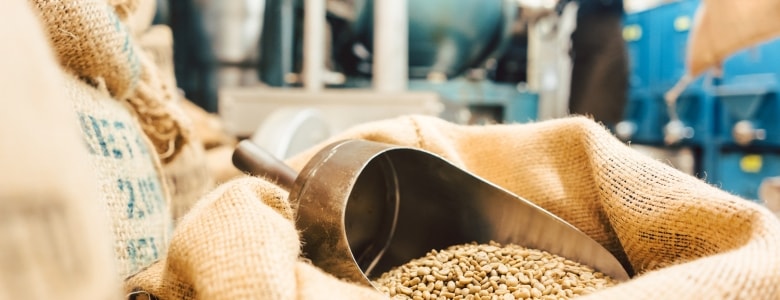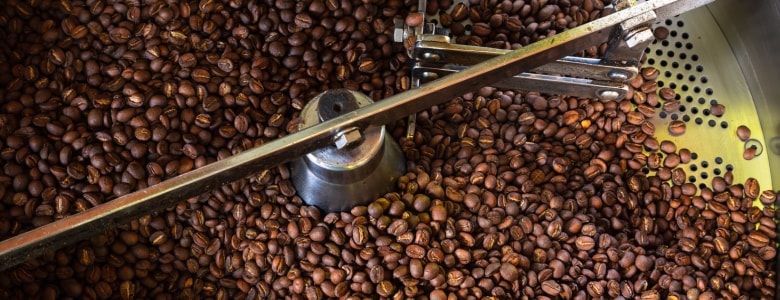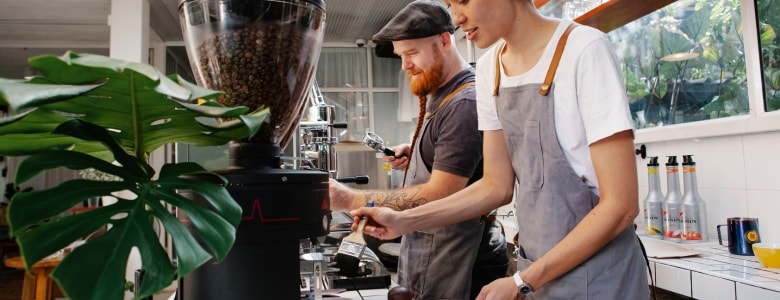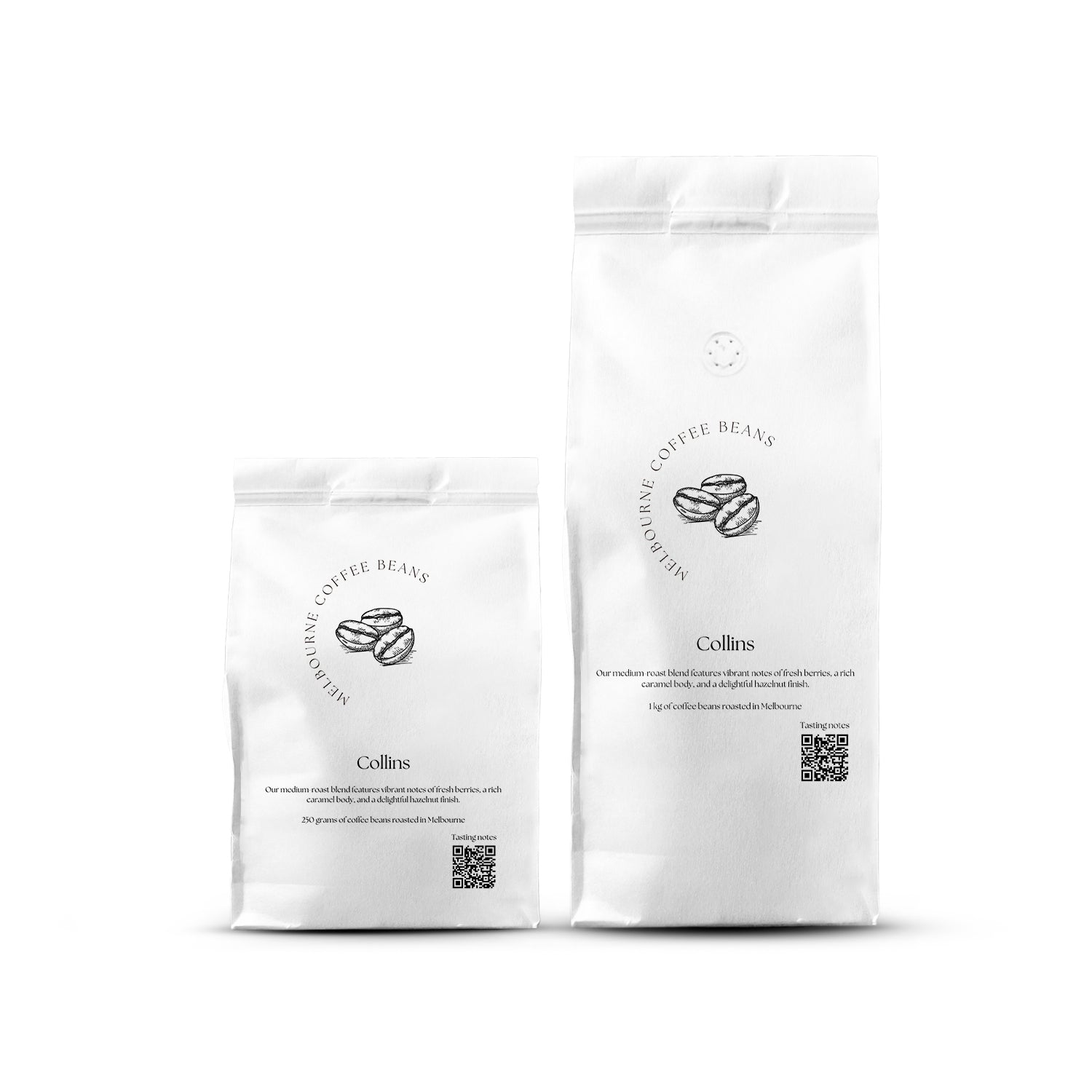What is the shelf life of coffee beans? Both raw and roasted coffee beans possess a finite period during which they stay fresh. This article aims to enlighten you on how long coffee beans typically last and provide guidance on extending their freshness for as long as possible.
Key Takeaways
- Coffee beans’ freshness depends on various factors, such as bean type, roast level, and storage conditions. Arabica beans and dark roasts generally last longer.
- Proper storage is key: use opaque, airtight containers and keep them in cool, dark, and dry places to extend the life of your beans.
- Avoid common storage mistakes like improperly using the fridge or freezer and buying in bulk; ensure beans are consumed within their prime freshness period for optimal taste.
1. Understanding Coffee Beans Shelf Life

It's important to know that coffee beans don't last forever. Their taste depends on several factors. The type of beans, how they're roasted, and how you store them all affect how good your coffee will be. So, how long do coffee beans last?
Arabica beans generally last longer than Robusta beans because of their delicate nature. Dark-roasted beans also tend to last longer than lighter roasts. The longer roasting process helps lock in their rich flavour.
2. Raw Coffee Beans
Think of unroasted coffee beans as the royalty of the coffee world. If kept dry, they can stay fresh for up to two years. They need to be protected from moisture. When stored right, they can deliver that perfect coffee flavour. Keeping them fresh is key to getting the full taste from these beans.
3. Roasted Coffee Beans

Freshly roasted coffee beans are perfectly crafted to delight your senses. However, their peak freshness is short-lived. If stored unopened, they keep their full flavour for six to nine months. Once opened, you’ll enjoy their best taste for up to six weeks.
The best time to enjoy their rich aroma and flavour is three weeks after roasting. Drink freshly roasted coffee soon to experience its exquisite quality at its peak.
4. Ground Coffee Beans

When you grind coffee beans, a burst of flavour is released. However, this fresh taste doesn't last long. Ground coffee is at its best within two weeks. It can stay fresh for up to five months if stored in an airtight container.
This delicate balance brings a rich, enjoyable taste with every sip of coffee from these well-preserved grounds.
5. Optimal Storage Conditions for Coffee Beans

Now, let's talk about how to keep coffee beans fresh. To make sure they stay fresh, you need to control four key factors:
- Keep them cool
- Store them in the dark
- Ensure a dry environment
- Seal them tightly
It is very important to do this correctly. Even a little air, light, or moisture exposure can cause the beans to lose their freshness, leading to a disappointing cup of coffee instead of a satisfying one.
6. Best Containers for Coffee Storage
Imagine a fortress, strong against light and air, protecting its precious treasure inside. That's what the best coffee storage container is like. It can be made from glass, ceramic, or metal as long as it's non-transparent and tightly sealed to keep the beans fresh.
Transparent containers might look nice, but they trick you. Like a siren's song leading sailors to danger, these jars cause your coffee to spoil quickly.
7. Ideal Storage Locations
You must think beyond just the right container to find the perfect place for your coffee beans. Keep them away from the heat of a stove or direct sunlight. Instead, choose a cool, dark spot in your home where your coffee can stay fresh and undisturbed until it's time to brew that perfect cup.
8. Common Mistakes in Coffee Bean Storage
Even the most careful people can be tempted by easy storage shortcuts, but these can cause coffee to lose its flavour. Storing coffee beans in the refrigerator or freezer can dull their rich taste. When stored this way, what was once vibrant beans can become bland and unremarkable.
9. Storing Coffee Beans in the Fridge
The idea of the refrigerator as a safe storage place for coffee beans is just an illusion. Behind its cold exterior are risks like odour absorption and condensation. These can give your beans unwanted flavours from other foods.
Refrigerating your coffee beans can compromise their quality. It's a gamble that isn't worth taking when the purity of your coffee is at stake.
10. Freezing Coffee Beans
If you do it correctly, freezing can help preserve your coffee beans. Use airtight containers to protect them from humidity and other odours. However, remember that this is a one-time method. Once you thaw the beans, you must use them for brewing. You cannot refreeze them.
11. Bulk Buying Coffee Beans
Buying coffee beans in bulk might seem like a good deal, but it's not cost-effective. Buying whole beans in smaller amounts is better to keep your coffee fresh and every cup as good as the first. This way, you can enjoy consistently fresh coffee.
12. Signs of Stale Coffee Beans
Despite your best efforts, time can still make your coffee beans stale. Knowing the signs of stale beans can help you avoid a bad coffee experience. Look for these indicators to ensure you enjoy a great cup of coffee.
13. Taste Test
The taste of your coffee is a big clue to its freshness. Your beans are likely stale if your coffee tastes dull or lacks vibrancy.
14. Smell Check
Trust your sense of smell to determine the freshness of your coffee beans. If their once-strong aroma is fading and replaced by a musty or bread-like smell, it's a clear sign that the beans are past their prime.
15. Visual and Texture Inspection

You can also check the freshness of your coffee beans by sight and touch. If the beans look dull, feel brittle, or have visible cracks, it's a sign that they've lost their vitality and freshness.
16. Can You Still Use Old Coffee Beans?
Even though fresh coffee is usually the best, older beans are valuable. They might not be perfect for your morning brew, but they can still be great for cold brew or other uses. These seasoned beans can add unique qualities to different coffee creations.
17. Drinking Expired Coffee
Drinking coffee made from expired beans isn't a health risk, but it can be disappointing. While safe, the coffee will likely lack the vibrant flavours that once pleased your taste buds.
Alternative Uses for Old Coffee Beans
Although aged coffee beans may not be ideal for your espresso maker, they can still be useful in other ways. They can enhance your garden, neutralize odours, and serve various purposes beyond brewing coffee. These beans have a surprising range of encore uses.
The Importance of Fresh Coffee Beans
Searching for fresh coffee beans isn't just a hobby for coffee lovers. It's essential for a great coffee experience. Fresh beans are the key to a cup of coffee with vibrant taste and aroma, capturing the true essence of coffee at its best.
Benefits of Freshly Roasted Coffee Beans
The appeal of freshly roasted coffee beans is their ability to release a complex and exciting range of flavours. Drinking coffee becomes an immersive sensory experience. Freshly roasted coffee turns your cup into a rich, full-bodied delight. Only recently, roasted beans can offer this magic, showing just how important freshness is for exceptional coffee.
How to Buy Fresh Coffee Beans
Getting the freshest coffee beans is a mission for the attentive. Check the roast date, connect with local roasters, and buy small amounts to enjoy your coffee at its best. Some people freeze their beans to keep them fresh, but others recommend storing them in a cool, dry place.
This three-part strategy helps you find the peak of coffee taste excellence.

Summary
As we wrap up our quest for the perfect coffee bean experience, remember that the journey is just as rewarding as the destination. With the knowledge of spot, store, and savour your beans, you're ready for countless mornings filled with the perfect cup. Let the ritual of brewing become a celebration of taste, showing that freshness is key in the world of coffee.
Frequently Asked Questions
How long do whole coffee beans stay fresh?
Coffee beans can maintain their freshness for approximately six to nine months when sealed, and the peak of their freshness occurs within three weeks after they have been roasted.
After breaking the seal, it is recommended that you use the whole coffee beans within roughly two weeks to enjoy the optimal taste.
Can I store coffee beans in the refrigerator to keep them fresh?
Keeping coffee beans in the refrigerator is ill-advised, as moisture can cause them to take on various smells and become stale.
To preserve your coffee’s freshness, place the beans in a container that prevents light from penetrating and ensures it is sealed tightly. The storage location should be both cool and devoid of light.
Is it safe to drink coffee made from expired beans?
As long as the beans haven’t developed mould, consuming coffee prepared from expired beans is typically harmless, though the taste might be compromised.
What's the best way to store coffee beans to preserve their freshness?
To maintain the freshness of your coffee beans, keep them in an opaque and airtight container, shielded from light, heat, and dampness. For optimal preservation, avoid using clear containers or storing near sources of heat.
Can old coffee beans be used for anything other than brewing coffee?
Certainly, old coffee beans remain suitable for preparing cold brew, and they can also serve as a natural fertilizer for your garden, an agent to neutralize odours or even as a component in homemade body scrubs.
It’s advisable not to discard them immediately!


